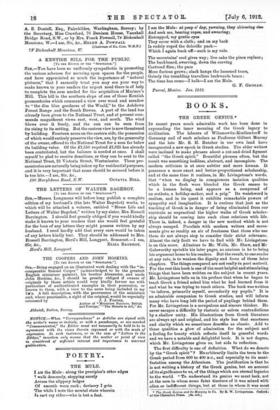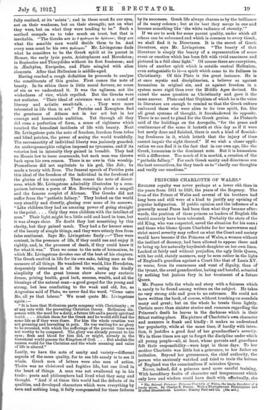BOOKS.
THE GREEK GENIUS.*
IN recent years much admirable work has been done in expounding the inner meaning of the Greek legacy to civilization. The labours of Wilamowitz-Moellendorff in Germany and of such scholars as Professor Gilbert Murray and the late Mr. S. H. Butcher in our own land have inaugurated a new epoch in Greek studies. The older writers were inclined to make phrases about a cut-and-dried figment called "the Greek spirit." Beautiful phrases often, but the result was something bodiless, abstract, and incomplete. The modern criticism is at once subtler and more human. It possesses a more exact and better-proportioned scholarship, and at the same time it realizes, in Mr. Livingstone's words, that "when we display in conspicuous isolation qualities which in the flesh were blended the Greek ceases to be a human being, and appears as a compound of an resthete, a holiday-maker, and a prig." Its watchword is realism, and in its quest it exhibits remarkable powers of sympathy and imagination. It is curious that just as the teaching of Greek is in danger of being eliminated from our curricula as unpractical the higher walks of Greek scholar- ship should be coming into such close relations with life. There is, indeed, a danger in the new method which is not always escaped. Parallels with modern writers and move- ments give so readily an air of freshness that those who use them do not always stop to consider their strict relevance. Almost the only fault we have to find with Mr. Livingstone is on this score. Allusions to Mr. Wells, Mr. Shaw, and Mr Galsworthy sprinkle his later pages, so anxious is he to bring his argument home to his readers. But the result, to one reader at any rate, is to weaken the dignity and force of these later chapters. The things compared are not really in pari materia. For the rest this book is one of the most helpful and stimulating things that have been written on the subject in recent years. Mr. Livingstone tells us in his preface that when he began to teach Greek a friend asked him what he had learned from it and what he was trying to teach others. The book was written 'to inform, primarily myself, secondarily my pupils." It is an admirable companion to Greek studies, and will inform many who have long left the period of pupilage behind them. For Mr. Livingstone is a scrupulous and sincere thinker. He never escapes a difficulty by rhetoric or solves contradictions by a shallow unity. His illustrations from Greek literature are always apt and original, and his style has that exactness and clarity which we sometimes describe as classic. Add to these qualities a glow of admiration for the subject and a feeling for beauty which reflects itself in graceful words and we have a notable and delightful book. It is not dogma, which Mr. Livingstone gives us, but aids to reflection.
The first difficulty is one of definition. What do we denote by the " Greek spirit" ? He arbitrarily limits the term to the Greek period from 600 to 400 B.C., and especially to its mani- festation among the Athenians. The justification is that he is not writing a history of the Greek genius, but an account of its significance to us, of the things which are eternal legacies to the world. " To understand its genius we must look, not at the men in whom some faint tincture of it was mixed with alien or indifferent things, but at those in whom it was most • The Creel. Genius and its Meaning to ITs. By B. W. Livingstone. Oxford: at the Clarendon Press. 1.6s. net.]
folly realized, at its saints ' ; and in these must fix our eyes, not on their weakness, but on their strength; not on what they were, but on what they were tending to be." Such a
method compels us to take much on trust, but that is inevitable. " The Greeks are &s b ipp(Spwas ttv 6pfeeter ; they are what the sensible man would decide them to be. And every man must be his own Masses." Mr. Livingstone finds what he considers to be the Greek spirit at its purest in
Homer, the early lyric poets, Aristophanes and Herodotus ; in Sophocles and Thncydides without its first freshness ; and in Aschylus, Euripedes, and Plato mingled with alien elements. After that Hellenism is middle-aged.
Having reached a rough definition he proceeds to analyse the constituents of this genius. First comes the note of beauty. In its ethics there is little moral fervour, no sense of sin as we understand it. It was the ugliness, not the wickedness of vice, which repelled. But the Greeks were not aesthetes. " Their ideal of existence was not a round of literary and artistic small-talk. . . . They were more interested in life than in art." Pericles and Xenophon find the greatness of Athens not in her art but in her courage and honourable ambition. Yet through all they did runs a perfection of form, a sense of rightness which touched the homeliest incidents of life with beauty. Next Mr. Livingstone puts the note of freedom, freedom from tabus and blind patches, the power of seeing the world truthfully.
The sacrosanctity of individual liberty was jealously guarded. An anthropomorphic religion imposed no tyrannies, and if its votaries lost in intensity they gained in breadth. They had no Mosaic law to issue commands, but each man was thrown back upon his own reason. There is no awe in this worship.
Prometheus did not capitulate to his god, like Job ; he made a treaty with Zeus. The funeral speech of Pericles puts this ideal of the freedom of the individual in the forefront of the glories of his country. Then comes the note of direct. ness, which Mr. Livingstone admirably illustrates by a com- parison between a poem of Mrs. Browning's about a seagull and the famous couplet of Alcman. The Greeks did not suffer from the " pathetic fallacy." They looked on the world very steadily and directly, glozing over none of its sorrows. "Like children they had an amazing power of going straight to the point. . . . Only they were children with the intellect of men." Their light might be a little cold and hard in tone, but it was always clear. No doubt they lost something by this clarity, but they gained much. They had a far keener sense of the beauty of simple things, and they were utterly free from false sentiment. Says Mr. Livingstone finely :—" They were
content, in the presence of life, if they could use and enjoy it rightly, and, in the presence of death, if they could know it for what it was." Then we come to the note of humanism, to which Mr. Livingstone devotes one of the best of his chapters. The Greek exulted in life for its own sake, taking man as the measure of all things. He wandered the world, like Herodotus,
desperately interested in all its works, rating the kindly simplicity of the great human show above any exoteric dream, prizing health, good luck, success, wealth, and all the blessings of the natural man—a good gospel for the young and strong, but less comforting to the weak and old, for, as Augustine said of Plato, we never find the word, "Come unto Me, all ye that labour." We must quote Mr. Livingstone again :-
" It is here that Hellenism parts company with Christianity ; or at-any rate with the prevailing Christian theory. Hellenism dis- penses with the need for a deity, a future life and a purely spiritual world. . . . Abolish them for the Greek and he would still lead the same life as if they were there. For him the whole creation was not groaning and travailing in pain. He was waiting for no glory to be revealed, with which the sufferings of the present time were not worthy to be compared. The glory was already present to his eyes ; flesh and blood for him did, or might, already in the terrestrial world possess the Kingdom of God. . . . But abolish the unseen world for the Christian and the whole meaning and value of life is altered."
Lastly, we have the note of sanity and variety—different aspects of the same quality, for to see life sanely is to see it
whole. Greek men of letters were also men of action. Theirs was no cloistered and fugitive life, but one lived in the heart of things. A. man was not swallowed up in his trade : poets and philosophers had lived what they sang and thought. "And if at times this world had the defects of its qualities, and developed characters which were everything by turn and nothing long, it fully compensated for these failures
by its successes. Greek life always Charms us by the brilliance of its many colours ; but at its best they merge in one and become something like the white radiance of eternity.'"
If we are to seek for some parent quality, under which all others can be subsumed and which is common to every Greek, we shall find it in Directness. It is the secret of Greek literature, says Mr. Livingstone. " The beauty of that literature is simply the beauty of a representation of some event or emotion which has been felt with vivid exactness and pictured in a full clear light." Of course there are exceptions, hints of another spirit which is outside central Hellenism, even antagonistic to it—a spirit which came to its fullness in Christianity. Of this Plato is the great instance. He is at once mystic and disciplinarian, a believer as against humanism in original sin, and as against freedom in a system more rigid than ever the Middle Ages devised. He raised the same question as Christianity and gave it the same answer. Plato and that Orphism of which he is the voice in literature are enough to remind us that the Greek culture embraced those who were alien to its true spirit, for, like all great systems of thought, it foreshadowed its opposite. There is no need to plead for the Greek genius. As Plutarch said of the buildings on the Acropolis, "for the grace and continuance of the same it looketh at this day as if it were but newly done and finished, there is such a kind of flourish- ing freshness in it, which letteth that the injury of time cannot impair the sight thereof." If we wish a closer appli, cation we can find it in the fact that in our own age, like the Greek, humanism is the dominant note. But it is humanism with a difference. Too much of it is morbid, a creation of the " pathetic fallacy." For such Greek sanity and directness are the best correctives, for they teach us to " clarify our thoughts and verify our emotions."



















































 Previous page
Previous page